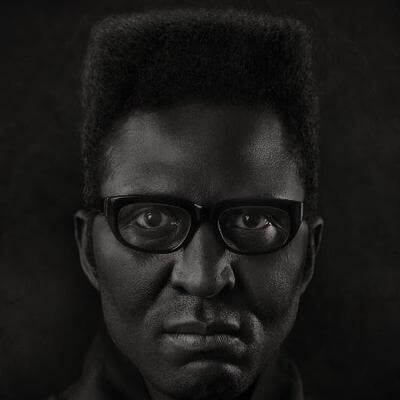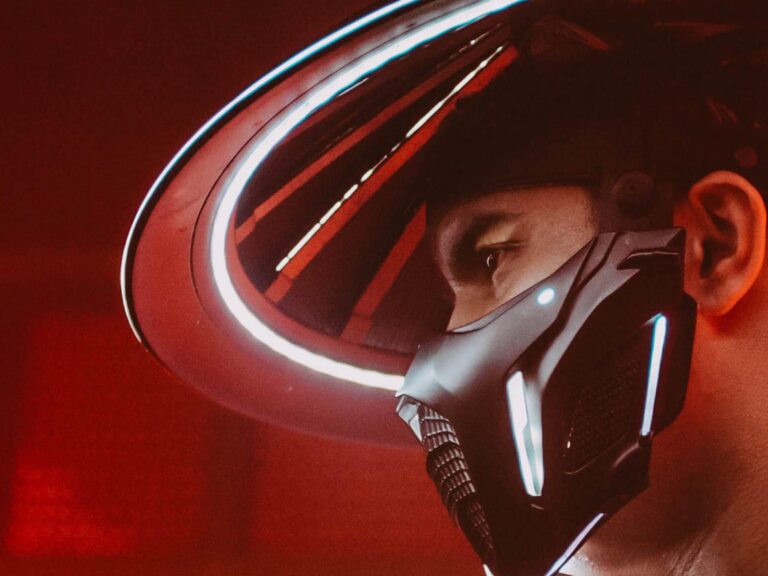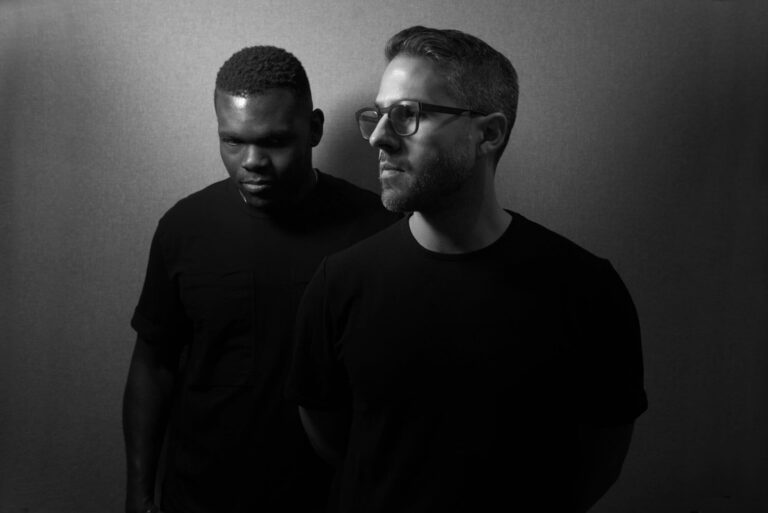Kirk Thompson can be pretty intense sometimes. Whether it’s that first time you ever got bulldozed by Warhead, got twisted in the tunnels of Coded Language or just straight up lost your shit to Angles…. When Krust hits you, you know about it.
Some of his most unique strikes, however, were his signature extended tracks. 10, 11, 12 minute odysseys. 13 in the case of Brief Encounters. These weren’t hits but rather total assaults of the senses. Cranial batterings that sucked you deep into own their brave new worlds. Intros that lasted for minutes. Off-beat basslines and unpredictable surprises. Patience, tension and eventual release; they were unlike anything else at the time and have matured, like a huge amount of mid 90s drum & bass, incredibly well. So well, London’s most important D&B bi-weekly is named after one of them.
Like most artists, after his Genetic Manipulations era, Krust moved on, refusing to cover old ground. He kept hitting us in different ways; first Reprazents took over, then his Kamanchi project with DJ Die, then his own above-mentioned Coded Language. Then an eventual break from the industry to spend a decade exploring a world beyond music. A world where he became a coach and, bizarrely, found himself teaching creative tools he’d learnt through making jungle to the disparate worlds of major global blue chip corporations.
His return to drum & bass has been gradual. One or two remixes here and there set the scene at the start of the decade before the warmly-welcomed relaunch of Full Cycle with Roni in 2016. Now comes the next logical step. The hit we’ve all been waiting for… New productions.
Krust’s first original new productions in over 10 years have landed this week via Doc Scott’s perennial 31. Two stark unhurried, unpredictable trips; both The Portal and Concealing Treachery build on the foundations set back during Krust’s most exciting, unique and intense chapter. Once again sucking us into their own worlds, they balance some of his most prominent signature aesthetics and approaches while facing forward and, as always, hitting us hard.
Krust’s intensity doesn’t stop there. Talk to him about his history, his art and his technique and he’ll hit you with the fired focus and circuitous sense of immersion. Just like many of his best tracks, he goes in deep and gives you the full narrative. And it doesn’t matter how far he’ll take you, he knows the ending will always loop you back.
No one does drum & bass like Krust. No one does interviews like Krust. Get to know…
Krust on 31! This is amazing. How long have you been plotting this?
Quite a while now. I made them at the start of last year but I’ve spent the last year building a new studio. Well, it took me three months to build and the rest of the time with my training wheels on, getting to know the new set-up, the room and how to mix down in it.
Building a studio from a blank canvas sounds like a producer’s dream!
To be honest, you don’t need it. That’s what I’ve learnt! I made some of best tunes in my basement studio with the most terrible acoustics you’ve ever heard. It was scatty as fuck putting tunes together in that room. But I learnt enough about dynamics for it sound good. I learnt enough about me to know what I was capable of.
Did you start making the signature long tracks in the basement or was that in the Full Cycle studio?
They were in the basement. Soul In Motion definitely was. But it didn’t matter where I made those tunes because in my head I wasn’t even making music then… I was making films.
Yeah that cinematic feel. Tracks on Genetic Manipulation sucked your right into their underbelly and wouldn’t let you go…
That was the idea. I have one philosophy – it’s the Warren Buffett philosophy. Look him up. What everyone else does, do the opposite. It knew this intrinsically before I even heard of Warren Buffett. For me it comes from being a b-boy. The worst thing you can do when you’re a b-boy is to rip on someone’s move. I came from a council estate in Knowle West where all you have is your word. If you can’t walk around with your head held high knowing you would do a windmill like no one else there wasn’t much going for you. I watched Wildstyle and it showed me I could be somebody by finding what I’m good at and getting really fucking good at it. We immediately started DJing, dancing, doing our thing- we all had our skills, DJ-wise, breaking-wise, graffiti, lyrics. And that’s been the way it’s been for me. Working out where I fit in and do my own thing and how I can perfect it. So DJing first – eight hours a day for 10 years, me and my brother. Learning. Then making music came along and the learning developed. But we had that DJ background. Not all producers did. You were either one or the other back then but we wanted to play our own music.
I think some of the best producers begin as DJs
Producers who didn’t DJ wouldn’t make the easiest tunes to mix that’s for sure. We wanted to make specific tracks to play out that would do different things in the DJ sets. Specific things for specific moments. Do you know the four levels of competency?
No sorry
Okay you start with unconscious incompetency, so you don’t even know you don’t know. The second is conscious incompetency, so you know that you don’t know. Third level is conscious competency, so you know you’ve learnt something and you’re aware of doing it. Then you have the unconscious competency – which is mastery. When you’re doing it so intuitively you don’t even think about it. So what’s the next stage after?
Tell me…
When you want to make something so epic, so next level it takes the world by storm. But to do that? You have to forget everything you’ve learnt before. To make tracks like Soul In Motion and Genetic Manipulation I had to re-understand everything. Breaks, basses, sounds, arrangement. I had to leave drum & bass. They’re not drum & bass, they’re not jungle. They’re pieces of music. I started to listen to classical music, watch films and read philosophies and watch documentaries and think about my approach that I wanted to take with my art. That’s where I started making art and not music.
Can you pinpoint that moment when you started thinking like that?
So at first jungle was just alive with ideas; people came from techno, house, reggae, rare groove, hip-hop, soundsystems. Everyone came with so many ideas. You’d be in the cutting house and hearing Dillija bust out a tune or Ed Rush & Optical bust out a tune be like ‘what the fuck are you doing? This is crazy!’ It was so inspiring, keeping us on our toes all the time. Over that time jungle really established itself – labels, events, agents, prs, all that. So once that was established everyone was like ‘okay where is this going next?’ We were being signed, music was in adverts, there was attention. So I spent a lot of time thinking about where I could go next.
Soul In Motion was an early example of where you were taking it next…
Yeah. So that all came about through the intro. It started like all tunes; going through my record collection, looking for samples. An average sampling session would be four days. In that process you’d hear things that stand out. Mentally you build the skeletons. After sampling you’d go into chopping mode, then looping. We’re weeks deep into the process now, just spending that time deep in the sounds, building patterns and loops and sketches, finding what works. With Soul In Motion it was the intro. I asked myself ‘what is the sound telling me to do?’ It sounded so good I doubled the length of it. That intro alone was three minutes.
The opposite of what people were doing.
Yes! People were doing short intros, I’m gonna do a long-assed intro! So I had the beat and that was working. I was also working on a minimal bass sound with the bass syncopated with the kick drum. It wasn’t meant to sit right. I wanted it to be awkward for the ear to get used to. I wanted it to stand out. I wanted to take out all the basses you’d normally hear. It was very geometric for me – I could the picture the shape of how the bass would come in on the kick drum. I pictured it like a snake writhing in and out. Then all of a sudden there’d be a surprise when you least expect it.
Just like a film.
Exactly. I wanted to transport you into an area similar to cinema. It doesn’t matter how many films you’ve seen, when you watch a good film you don’t know what the fuck is going on. You can’t do that with short tunes. You need that ride. Kubrik takes you on a ride, Nolan takes you on a ride. When you watch a film for the first time you don’t know what’s going on. Star Wars? No one knew what the fuck was going on when they first watched that. It changed the world. Terminator 2? No one knew what the fuck was going on. It changed the world. The Matrix. Predator. They changed the world. The psychological journey needs depth and you need depth to speak to your subconsciousness. I had to go into my own subconscious to create things like Soul In Motion and Genetic Manipulation
What was the reaction to you going against the grain?
Largely positive. People were like ‘this is new, this is different’. People were talking about listening to it the first time – all sitting there in silence. I’d be the same making it. It makes you think about your own story and where the music is taking you. It was very self-indulgent – it was me discovering what I wanted to do, how I wanted to express myself. It wasn’t for money or radio or club plays. It was an exploration in the depths of what you can do with the technology we had at the time, what I’d done with my life at the time. It opened up a new doorway for me in a world of life and experience and what else is possible.
What did it show you?
It showed me I could apply an understanding of film to music. That I could find the gaps where no one is working. I didn’t know at the time, but that’s actually a business philosophy. When I studied business 10 years later I realised this. Look at Apple when they launched the iPhone. Sony and Nokia were running things but Apple looked at it and said ‘why aren’t they moving on?’ That was the switch I made when I stopped thinking as a producer and as an artist. What is everyone else doing? What aren’t people doing? What’s missing?’
What was the next gap you saw?
Well Reprazent happened. And life went crazy. We got headhunted by labels and propelled into another lane. A lot of remixes, a lot of travelling.
You couldn’t spend two weeks on a track
Exactly. Albums were happening. Reprazents albums. The I Kamanchi album with Die. Then my own album Coded Language. By then I’d changed what I was doing because I didn’t want to repeat myself. I didn’t need to do another Soul In Motion. I’d done. But my next big breakthrough was coaching.
Yeah you took some time out didn’t you?
I had to. I’d been in the industry for 20 years and needed to develop in different ways. And what I found was people were asking about how to start labels, how make music. No music colleges were teaching this. They didn’t know how to start a label, the teachers hadn’t been part of a movement. So I worked out what they needed to know and the state of mind you need to be in to learn it and teach it. After a while I went from teaching one person to teaching kids, budding musicians and eventually working for ad companies. Giving workshops to big corporate agencies on how to be creative and think out of the box.
I love this. A b-boy original Bristol junglist teaching corporations to think creatively. The unseen influence!
It went deep mate. I was in some exciting places. And I went deeper and deeper studying NLP and becoming a practitioner.
What’s NLP?
Neurolinguistic programming. How you use language to describe your reality. I learnt other modalities, too. They all involve the thinking process and how we understand reality. I began to understand why people get blocks. I found that we stumble when we think we do what do just to make money. We need to understand what makes value. If I was thinking about making money I’d never have made Genetic Manipulations.
I think it’s harder for new producers to think they can be that creatively free, it’s an even tougher game now…
All day long. But because of this, people need to think about their value even more. The worst thing an up-and-coming artist can do is copy everyone. Life right now is like this; stop thinking like a DJ, stop thinking like a producer. You are now a product, You are a business.
So you have to think of yourself as an artist and as a brand?
Yes. Now is a good time if you do something unique. It’s not enough to be a DJ, be a cook, be a writer. You have to be multi-dimensional to be noticed and be someone of worth in the value system. If I’m the same as everyone else what’s the point?
Back to Kowle West and the b-boy moves
Exactly. Warren Buffett. I already told you to look him up: If everyone sells, buy. If everyone buys, sell. People think technology is the answer but we haven’t figured out what technology is for. Look at what’s going on – poverty is massive. How the hell in this day in age are we still in poverty and most kids are uneducated? Why hasn’t tech solved the problems? Because it’s not the answer. We need to understand humans first. Then use the technology.
Just like in production. At first everyone went inside the box. Now we’re venturing outside the box again but combining the two. We compromised our sound for technology. So where else are we compromising things for technology?
Our social life for the internet?
Exactly! We could talk about this for days. Bottom line: humans can’t be taken over by technology… Yet. Technology can’t make a better Krust tune. For me to have value in the world, I have to make something that only sounds like me and the most authentic I can be. People like it when I’m authentic Krust. When there’s a sound they know that’s me. That’s what’s happened with Portal and Concealing Treachery. People were saying ‘it’s good to hear Krust coming back with that sound’ I feel good and comfortable and confident about this sound and approach again and have ideas on how to develop it. That’s why I haven’t put any records out for a long time – I’ve had he training wheels on and have been working out how to get the best of technology… But not let it get the better of me.
Wow, you’ve just fully cycled us through your whole career and back to the start. A massive loop of decades!
That’s how long it takes sometimes. Seeds don’t grow over night.
What’s growing next? I sense there’s more…
This is the beginning of something, yeah. I’ve got something really big coming that I know a lot of people are going to be happy about and I really want to get it out, but it’s a bit too soon. It’s epic and special, that’s all I can say. I can’t wait to get this underway.
Krust – The Portal / Concealing Treachery is out now on 31 Records
Follow Krust: Facebook / Twitter


